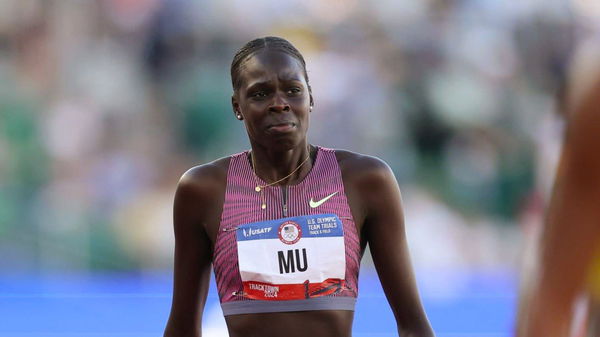

Would you believe that Athing Mu will be unable to defend her crown in Paris? This surprising turn that occurred at the U.S. Olympic Trials finals frequently presents unexpected hurdles. The road to Paris 2024 for Athing Mu, the defending 800m Olympic champion, ended dramatically when the 22-year-old’s appeal was denied after a tumble at US track trials. Fans were shocked by her fall in the championship.
Michael Johnson, a former track star, has come forward to defend the USA Track and Field (USATF) selection procedure despite the heartbreak. His viewpoint has spurred discussion about the current system’s accuracy and fairness. Michael Johnson tweeted his comments after Athing Mu’s fall and the USATF’s subsequent denial of her appeal. “I think we all feel terrible for Athing,“ he tweeted. “Our US Trials selection policy works best because it eliminates politics in selection.“
Additionally, this kind of procedure is permitted by the US team’s depth. Michael Johnson added, “And the strength and depth of the US team allows such a policy.“ However, Johnson also retweeted an NBC Olympics & Paralympics post that stressed how electrifying the trials’ women’s 800-meter final was. “Dramatic final in the #TrackFieldTrials24 women’s 800m,” the tweet stated. “American record-holder Athing Mu falls 200m into the race and Nia Akins wins, running the fastest time of her life (1:57.36).“
ADVERTISEMENT
Article continues below this ad
I think we all feel terrible for Athing. Our US Trials selection policy works best because it eliminates politics in selection. And the strength and depth of the US team allows such a policy. https://t.co/83DGIVMjP5
— Michael Johnson (@MJGold) June 25, 2024
Mu went down in the first lap in the 800m event. She tried to rebound, but she came in last, eliminating any chance she had of defending the crown in Paris. Mu displayed hope in the semifinals, finishing her semifinal at 1:58.84. But in finals, she fell short. Athing Mu had been recovering from a hamstring injury and went on a sabbatical to revive her love of running. But USATF officials rejected her appeal, which stated that she had been clipped by another runner.
ADVERTISEMENT
Article continues below this ad
Athing Mu’s coach’s thoughts after the denial
Mu’s appeal was denied, which has caused a great deal of debate. Despite watching the race tape, track officials decided not to rule in Mu’s favor, citing inadvertent contact as a regular element of racing. Mu’s coach, Bobby Kersee, contended that she fell because another runner clipped her. He brought out that Mu’s ankle was hurt and that she had scraped from the event.
Mu can still compete for Team USA in the 4x400m relay, the race in which she took gold, and is still eligible for the relay pool notwithstanding the setback. Kersee acknowledged the unfairness of the U.S. selection process, which determines Olympic qualification only by the best three trial finishes, independent of prior performance.
ADVERTISEMENT
Article continues below this ad
“I’ve coached it, I’ve preached it, I’ve watched it,” Kersee added. “And here’s another indication that regardless of how good we are, we can leave some better athletes home than other countries have. It’s part of our American way.“
However, critics counter that the system isn’t always that flexible. They draw attention to the fact that great athletes like Mu can be disqualified from the Olympics because of an unexpected event that occurred during the trials. The argument over the USATF regulations is a focal point for a larger conversation about how to strike a balance between the need to pick the best athletes and fairness.
ADVERTISEMENT
ADVERTISEMENT
ADVERTISEMENT
ADVERTISEMENT

